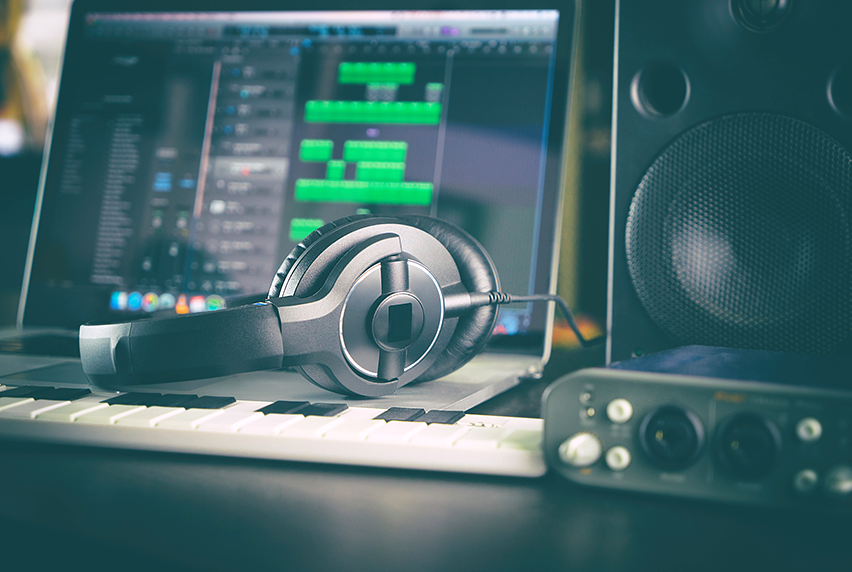Exploring the Possibilities of a Music & Sound Production Degree

Music has the power to move and inspire people — and for those with a passion for music production, there is nothing more fulfilling than creating music that connects with others.
Music production is the art of creating and producing your own music, whether that be for commercial or personal purposes. It involves the use of various recording techniques, sound engineering, mixing, mastering, and other technical aspects of music creation.
If you are considering pursuing a degree in music production, you may be wondering what opportunities await you after graduation. In this blog, we’ll answer some of those questions you might have — read on to find out more.
Do you need a music degree to be a musician?
While many successful musicians have started their careers without formal education in music production, a music production degree can provide graduates with a solid understanding of music theory and production techniques, giving them an edge in the industry.
By studying music production courses, students learn how to produce, engineer, mix, and create music, as well as develop their music theory knowledge. Music degrees are highly versatile and open up numerous opportunities in the music industry. Graduates may work in recording studios, produce and engineer music for artists, bands, and film projects, or work in live sound engineering or video game development.
What are the career opportunities in music production?
With the rise of digital technology, the music industry has experienced a significant transformation, and music production is a rapidly evolving field with a wide range of career opportunities.
Graduates may choose to work in various roles, such as:
Music producer
A music producer oversees the entire process of creating a song, from its conception to the final product. They work closely with musicians, songwriters, and engineers to create the best possible sound.
Sound engineer
A sound engineer is responsible for the technical aspects of music creation, such as recording, mixing, and mastering. They work closely with the producer and musicians to achieve the desired sound.
Composer
A composer creates original music for various projects, such as films, television shows, commercials, and video games.
Music supervisor
A music supervisor is responsible for selecting and licensing music for use in various media, such as films, television shows, and commercials.
Studio manager
A studio manager is responsible for overseeing the day-to-day operations of a recording studio. This includes managing staff, scheduling sessions, and maintaining equipment.
These are just a few of the career opportunities available in music production. With the rise of streaming services, graduates may also choose to work in music management, where they can develop their artists’ careers and help to get their music heard by a larger audience.
How can I get started and succeed in the music industry?
Australia has a vibrant and diverse music scene, with many opportunities for musicians to showcase their talent.
If you're interested in pursuing a career in music production, getting a degree in this field can provide you with the knowledge and skills necessary to succeed.
Here's a look at how you can get started and succeed in the music industry in Australia:
Develop Your Skills
To be a successful music producer, you need to have a strong foundation in music theory and composition.
A music production degree program can teach you everything from the basics of music theory to advanced production techniques.
You'll learn how to use digital audio workstations (DAWs), music production software, and other tools to create professional-quality music. You'll also have the opportunity to work with industry-standard equipment and software to gain hands-on experience.
Network and Collaborate
Networking and collaboration are essential components of the music industry. By connecting with other musicians, producers, and industry professionals, you can build relationships that can lead to future collaborations and opportunities.
Attend music events, join online communities and forums, and engage with fellow musicians and producers to expand your network.
Build Your Portfolio
Building a strong portfolio is critical to succeed in the music industry. This means creating high-quality music that showcases your skills and talent.
As you gain experience and build your network, you'll have more opportunities to produce music for clients and collaborators. Take advantage of these opportunities to build your portfolio and showcase your work.
Stay Up-to-Date
The music industry is constantly evolving, with new technologies and trends emerging all the time. To stay competitive, you need to stay up-to-date with the latest industry developments.
This means keeping an eye on new music production techniques, software, and equipment. Subscribe to industry publications, attend conferences and seminars, and participate in online communities to stay informed.
Pursue Opportunities
There are many different career paths you can pursue in music production, from working as a music director or recording engineer to starting your own record production company.
When pursuing opportunities, be proactive and don't be afraid to take risks. Start small and work your way up, and always be open to new opportunities and challenges.
To tell your story with sound, Melbourne Polytechnic’s Music and Sound Production courses will nurture your skills through practical projects and learning. As one of Australia’s largest providers of contemporary music education, study one of our Certificate, Diploma, Advanced Diploma, or Bachelor courses to develop your skills under the instruction of active industry-experienced experts.
Music and Sound Production
Gain an upper hand in the competitive Music and Sound Production industry with courses that provide you with networking opportunities.